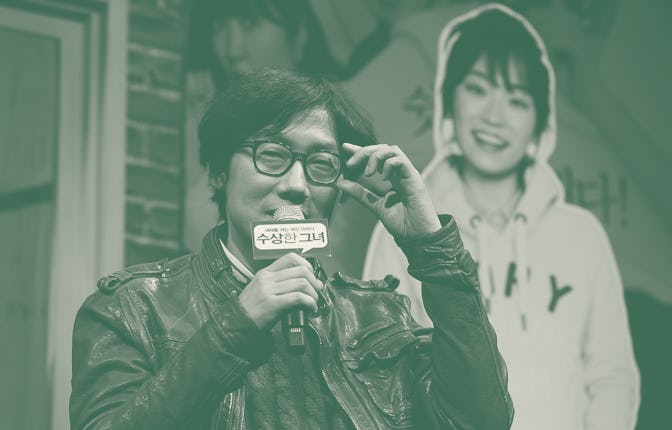The ‘Squid Game’ creator better be getting paid out the ass for season 2
Despite the show generating roughly $900 million for Netflix, Hwang Dong-hyuk says he’s still “not that rich.”

Art, of course, imitates life. For Hwang Dong-hyuk, the creator of Squid Game, you can draw a straight line between reality and his brutalist spectacle of financial desperation. In a recent interview with the Guardian, Hwang explained that he began coming up with the Netflix show, a bona fide global sensation, when he was in dire circumstances following the economic crash in 2008.
“I was very financially straitened because my mother retired from the company she was working for,” he explains. “There was a film I was working on but we failed to get finance. So I couldn’t work for about a year. We had to take out loans — my mother, myself and my grandmother.” Beyond serving as what many see as a broad critique of global capitalism, the show makes reference and is partly inspired by the widespread debt crisis in South Korea.
Yet now, following the historic success of Squid Game, which has become Netflix’s most popular show of all time, life in a way is imitating art. Despite the fact that the show will singlehandedly net some $900 million for the streamer, Hwang is “not that rich.” And, he adds, “it’s not like Netflix is paying me a bonus. Netflix paid me according to the original contract.”
Of course, the idea of Netflix simply adhering to an agreed-upon contract is not necessarily some stark emblem of the exploitative nature of capitalism. But the entire world of Squid Game came from Hwang, who wrote and directed the entire series alone and in the process apparently lost six of his teeth from stress. To consider the nearly ten-figures that a massive global corporation is reaping out of this one man’s output, and for Hwang’s reward from the unprecedented success (the nine-episode series reportedly cost only $21 million to make) of a show about extreme inequality to remain the same, is to see at the very least a tinge of sad irony.
The defense that neoliberals might use to advocate for the mega-fortunes of billionaire capitalists — that they came up with the idea for their business, they took the risk and worked hard to build it and should in turn be entitled to the full, unfettered claim of profit — doesn’t seem to apply here. Granted, Hwang notes that he is doing fine and has enough “to put food on the table.” In regards to the potential contradiction of a giant streamer funding an anticapitalist show, “Netflix is a global corporation but I don’t think it is aggravating inequalities,” he notes. “I don’t think there is a contradiction.” What’s more, surely Squid Game will afford him an entire world of new avenues as a filmmaker.
Yet when you see where all the cards lay after the ungodly amount of money that has come from Squid Game’s runaway success, Hwang still looks more like one of his lowly competitors in a green tracksuit. When the second season of his show inevitably happens (despite his somewhat noncommittal stance thus far), let’s just say that Hwang better be getting a comically large check.